
Anthony James Donegan, known as Lonnie Donegan, was a British skiffle singer, songwriter and musician, referred to as the "King of Skiffle", who influenced 1960s British pop and rock musicians. Born in Scotland and brought up in England, Donegan began his career in the British trad jazz revival but transitioned to skiffle in the mid-1950s, rising to prominence with a hit recording of the American folk song "Rock Island Line" which helped spur the broader UK skiffle movement.
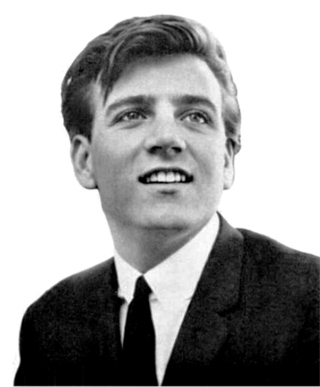
William Howard Ashton, known professionally as Billy J. Kramer, is an English pop singer. With The Dakotas, Kramer was managed by Brian Epstein during the 1960s and scored hits with several Lennon–McCartney compositions never recorded by the Beatles, among them the UK number one "Bad to Me" (1963). Kramer and the Dakotas had a further UK chart-topper in 1964 with "Little Children" and achieved U.S. success as part of the British Invasion. Since the end of the beat boom, Kramer has continued to record and perform. His autobiography, Do You Want to Know a Secret, was published in 2016.

King of Skiffle is an album by Lonnie Donegan. A CD version of the album was released in the United Kingdom on 18 February 1998 by Castle Music. The CD was also released by Pickwick under the title The Best of Lonnie Donegan.
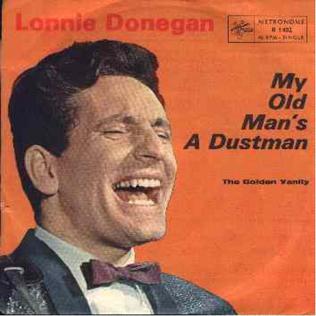
"My Old Man's a Dustman" is a song first recorded by the British skiffle singer Lonnie Donegan. It reached number one in the British, Irish, Australian, Canadian, and New Zealand singles charts in 1960. The chorus of the song is:

"All Shook Up" is a song recorded by Elvis Presley, published by Elvis Presley Music, and composed by Otis Blackwell. The single topped the U.S. Billboard Top 100 on April 13, 1957, staying there for eight weeks. It also topped the Billboard R&B chart for four weeks, becoming Presley's second single to do so, and peaked at No. 1 on the country chart as well. It is certified 2× platinum by the Recording Industry Association of America.
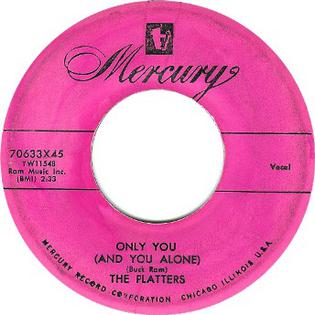
"Only You (And You Alone)" (often shortened to "Only You") is a pop song composed by Buck Ram. It was originally recorded by The Platters with lead vocals by Tony Williams in 1955.
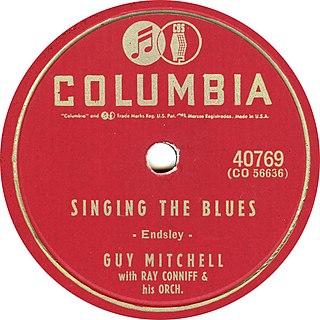
"Singing the Blues" is a popular song composed by Melvin Endsley and published in 1956. The highest-charting version was by Guy Mitchell and The first recording of the song was by Marty Robbins. It is not related to the 1920 jazz song "Singin' the Blues" recorded by Frank Trumbauer and Bix Beiderbecke in 1927.
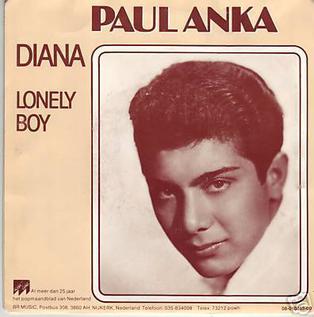
"Diana" is a song written and first performed by Paul Anka, who recorded it in May 1957 at Don Costa’s studio in New York City. Anka stated in his autobiography that the song was inspired by a girl named Diana Ayoub, whom he had met at his church and community events, and had developed a crush on. Session musicians on the record included George Barnes playing lead guitar, Bucky Pizzarelli playing the "Calypso" riff on guitar, Irving Wexler on piano, Jerry Bruno on bass, and Panama Francis on drums. The song was recorded in May 1957 at RCA Studios in New York. Backup singers included Artie Ripp.
"Young Love" is a popular song, written by Ric Cartey and Carole Joyner, and published in 1956. The original version was recorded by Ric Cartey with the Jiva-Tones on November 24, 1956. It was released in 1956 by Stars Records as catalog number 539 and one month later by RCA Records as catalog number 47-6751. Cartey's version never charted.
"Rock Island Line" is an American folk song. Ostensibly about the Chicago, Rock Island and Pacific Railroad, it appeared as a folk song as early as 1929. The first recorded performance of "Rock Island Line" was by inmates of the Arkansas Cummins State Farm prison in 1934.
The Vipers Skiffle Group – later known simply as The Vipers – were one of the leading British groups during the skiffle period of the mid to late 1950s, and were important in the careers of radio and television presenter Wally Whyton, coffee bar manager Johnny Martyn, wire salesman Jean Van den Bosch, instrument repairer Tony Tolhurst, journalist John Pilgrim, record producer George Martin, and several members of The Shadows.
"The Story of My Life" is a song written by Burt Bacharach and Hal David. It was published in 1957. It was recorded by Marty Robbins and it reached number one on Billboard's country chart in 1958, and it became a number one hit song for Michael Holliday in the UK.
A sporting song is a folk song which celebrates fox hunting, horse racing, gambling and other recreations.
"Does Your Chewing Gum Lose Its Flavour " is a novelty song by Lonnie Donegan. Released as a single in 1959, it entered the UK Singles Chart on 6 February 1959 and peaked at number three. It was also Donegan's greatest chart success in the United States, reaching number five on the Billboard Hot 100 chart in 1961.
"Gamblin' Man" was a 1957 hit single for skiffle artist Lonnie Donegan. It was recorded live at the London Palladium and released as a double A side along with "Puttin' On the Style". It reached No. 1 in the UK Singles Chart in June and July 1957, where it spent two weeks in this position. This was the last UK number 1 to be released on 78 rpm format only, as 7" 45rpm vinyl singles were becoming the norm by this time. The original Pye Nixa release does not exist on 7" format.
"I'll Never Fall in Love Again" is a song written by Lonnie Donegan and Jimmy Currie, and first released by Donegan as a single in 1962.







